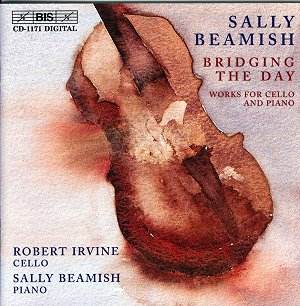This interesting anthology of music for cello and piano
(the instruments figure both in partnership and individually) "bridges"
not only twenty-one years of Beamish’s career but also her move, around
ten years ago, to Scotland, a change that was to have a major impact
on her music. It is no coincidence that the cello plays a significant
part in her impressively prolific output, as the soloist here Robert
Irvine, happens to be the composer’s husband. Many of the works therefore
have highly personal connotations, a fact that comes across clearly
in the intimacy of the performances.
The earliest work represented, the miniature Entre
Chien et Loup, dates from Beamish’s student years and reflects a
self confessed fascination with the music of Webern and Luigi Dallapiccola.
Lullaby for Owain, written six years later for a friend following
her giving birth to a baby with Down’s syndrome (an issue close to the
composer’s heart as her own brother has Down’s syndrome) shares the
same sound-world. Neither piece, whilst articulate in realisation, is
truly representative of Beamish’s mature language. The other piano miniature,
Kyle Song is far more effective, described by the composer as
a "boat song" and inspired by a friend’s love of sailing on
the Kyle of Lochalsh. In complete contrast The Wise Maid was
conceived as an unaccompanied encore for her husband and takes great
fun in weaving a tiny set of variations on an Irish fiddle tune into
a deceptively virtuosic little showpiece.
The four more substantial works on the disc all date
from the mid to late 1990s (the Sonata was only completed last
year) and in differing ways reflect the growing influence on the composer
of Scottish folksong as well as jazz. Anyone who is familiar with the
previous BIS release of Beamish’s music featuring the fine saxophone
concerto, The Imagined Sound of Sun on Stone, will be
in recognisable territory here. The folksong influence is most prevalent
in Gala Water, a beautiful, highly lyrical outpouring based on
the tune Braw Braw Lads of Gala Water, and made all the more
poignant by the composer’s explanation, in the booklet notes, that it
was written as an expression of grief at the loss of a baby by miscarriage.
The work that lends its title to the disc, Bridging the Day,
was inspired by the surroundings of Brook Cottage, the home of the friends
who commissioned the work. It explores the different aspects of light
across the valley where the cottage lies, taking the listener from daybreak
through the "morning shimmer" of the sun and afternoon by
the brook to sundown. Again, Beamish makes fine use of the lyricism
of the cello and in the melodic structure of the work, manages cleverly
to create the feeling of time passing through the day. It is a piece
that I found quite magical in its atmosphere.
Iasg (the Gaelic for fish and pronounced "eesk")
is perhaps the grittiest in its language. However once again there is
a strong lyricism that lies at the heart of the piece. The journey here
is that of a salmon, from its birth in a mountain stream to its final
struggle in reaching its birthplace to die. The slower central section
depicts the long period of feeding in the open sea. As in Bridging
the Day Beamish is impressive in her ability to weave a convincing,
strongly cogent single movement span. Beamish’s recent Prom commission,
Knotgrass Elegy draws on a wide variety of stylistic influences
with jazz playing a major part. In similar vein, the four movement
Sonata for cello and piano (presumably written around
the same time as Knotgrass) is the most overtly jazz-influenced
of the works on this disc although the influence is always carefully
disseminated within the composer’s own very personal language. Each
movement forms a musical portrait, of the composer herself, her husband
and the two close friends who commissioned the work. It bares the stamp
of jazz both rhythmically and melodically, most obviously in the second
movement scherzo with its echoes of Thelonius Monk. The haunting simplicity
of the slow movement Ballad is exceptionally beautiful and Irvine
responds with playing of moving tenderness.
The intimate nature and understanding of these performances
is evident throughout in Robert Irvine’s passionately committed playing,
the composer providing able accompaniment. There are occasions when
for my taste the cello should be a little more forward in the balance
but overall the sound is good, with a natural and realistic acoustic.
A warmly recommended disc which should make many new friends for Sally
Beamish’s distinctive and thoughtful music.
Christopher Thomas

![]() Robert Irvine (cello)
Sally Beamish (piano)
Robert Irvine (cello)
Sally Beamish (piano)![]() BIS BIS-CD-1171
[63:55]
BIS BIS-CD-1171
[63:55]